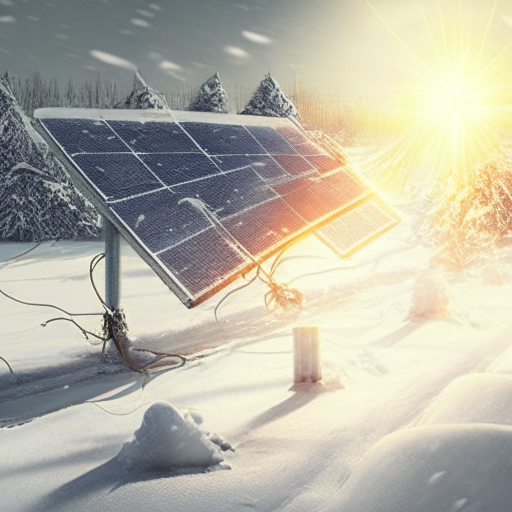Maximize Solar Energy Efficiency in Harsh Winter Conditions for Optimal Performance
As a dedicated survivalist, you deeply understand the critical importance of achieving self-sufficiency, especially when confronted with the challenges posed by severe winter weather. One of the most pressing issues you may encounter is how to effectively utilize renewable energy sources, particularly solar power, in extremely cold conditions. While the harsh chill of winter might seem like a formidable obstacle, there is no need for alarm! This comprehensive article will delve into the vast potential of harnessing solar energy in frigid climates. We will unveil actionable strategies that empower you to optimize solar energy use even in the harshest winter conditions by taking a proactive and informed approach.

Many people mistakenly believe that solar electricity is only viable in warm, sun-soaked regions. However, advancements in technology have made it entirely feasible to capture solar energy in colder climates. Let’s explore the various techniques that enable solar power systems to thrive even in extreme cold. Understanding and leveraging these innovative methods will allow you to utilize this sustainable, eco-friendly energy source to improve your lifestyle and enhance your survival strategies effectively.
First and foremost, it is essential to recognize that solar panels generate energy from sunlight, not warmth. While cooler temperatures may influence the efficiency of solar panels, they do not render them ineffective during winter months. By employing strategic planning and innovative techniques, you can significantly enhance the performance of your solar power system, ensuring it operates at maximum efficiency even in the coldest environments. Gaining insight into the mechanics of solar panel functionality across varying temperatures will enable you to make educated decisions that align with your energy needs and goals.
One vital aspect of optimizing solar electricity generation in cold climates is the angle and orientation of your solar panels. Proper alignment can substantially boost the amount of sunlight your panels receive daily. During the winter months, the sun’s trajectory is lower in the sky, making it crucial to tilt your panels at a steeper angle. This adjustment facilitates maximum sunlight capture, thereby enhancing their efficiency. Additionally, orienting your panels towards the south can further improve their sunlight collection capabilities, which is particularly advantageous during the shorter days of winter.
Snow accumulation is another significant challenge in colder regions that can obstruct the effectiveness of your solar panels. A heavy layer of snow can drastically reduce electricity output. However, by proactively addressing this issue, you can implement effective solutions. Consider the installation of snow barriers or heating elements on your solar panels to prevent snow buildup. These enhancements not only aid in melting existing snow but also ensure continuous energy production, even during snowstorms. Regularly clearing snow by hand can also serve as an effective maintenance strategy, keeping your panels functioning optimally and free from obstructions.
Incorporating battery storage systems is a forward-thinking strategy to amplify solar power efficiency in cold conditions. These batteries are designed to store excess energy generated during daylight hours for use when sunlight is scarce or temperatures drop. The importance of battery storage is particularly pronounced in freezing conditions, as it ensures a reliable supply of electricity when you require it most. By investing in a dependable battery system, you can maintain your energy independence and be prepared for any unforeseen circumstances that may arise during severe weather events.
Choosing the right type of solar panels is critical for optimizing the efficiency of your solar energy system in cold climates. Certain panels are designed to perform better under lower temperatures and may feature enhanced insulation or specialized materials that minimize the impact of frost and ice on their performance. By making informed decisions regarding the types of panels that best suit your cold environment, you can maximize energy production and ensure your solar power system meets your energy needs effectively.
Beyond the technical aspects, having your solar power system installed by professionals with experience in cold climate conditions is essential. Skilled installers can provide best practices for installation, ongoing maintenance, and troubleshooting, offering invaluable insights into how to optimize your system. Their expertise will help ensure that your solar setup operates at peak efficiency, even under the most challenging winter conditions, ultimately enhancing the reliability of your energy source and your overall energy strategy.
Maintaining a proactive and prepared mindset is crucial in survival scenarios. While solar power can serve as a reliable and effective energy source in cold climates, having backup generators or alternative energy solutions is vital. These additional measures will act as a safety net in case of prolonged periods of low sunlight or unexpected system failures. By integrating solar power with other renewable energy sources, you can further enhance your energy independence and resilience, ensuring that you are well-equipped to tackle any weather-related challenges that may arise.
Solar energy is not confined to warm and sunny areas; it possesses immense potential even in the coldest climates, as long as it is strategically planned and technically advanced. By adjusting your panel angles, mitigating snow accumulation, incorporating battery storage, selecting suitable solar panels, relying on skilled installation, and having contingency plans, you can unlock the complete potential of solar energy in extreme cold. Embrace renewable energy with confidence and resourcefulness, securing your survival and sustainability in any climate.
The post Solar Energy in Extreme Cold: Unlocking Its Full Potential appeared first on Survival Bite.
The Article Solar Energy’s Full Potential in Extreme Cold Conditions Was Found On https://limitsofstrategy.com


This topic resonates with me deeply, especially given the growing awareness of energy sustainability in all climates. I once set up a small solar panel system during a particularly harsh winter in my area. At first, I was skeptical about its effectiveness under the snow and gray skies, but I discovered that even in cold temperatures, my panels were still generating power.
The insights you’ve shared resonate deeply with me, particularly the emphasis on self-sufficiency through renewable energy in harsh climates. Navigating the challenges of winter conditions while attempting to harness solar energy is indeed a critical consideration for survivalists and those aiming to live sustainably.
I completely relate to your sentiments about self-sufficiency through renewable energy, especially in challenging winter conditions. It’s fascinating to think about how the energy landscape shifts with seasons. While solar energy might not seem viable during overcast or snowy months, I’ve read about innovative techniques, like using solar thermal systems or integrating battery storage, that can really help mitigate those challenges.
Your thoughts on self-sufficiency through renewable energy really resonate with me. It’s true, the winter can be a tricky time, especially when we rely on solar power. I used to think that when the skies turned gray and the snow fell, my solar panels would be rendered useless. But like you mentioned, that’s where innovation steps in to save the day.
I can really relate to your experience with solar power during the winter. It’s a common misconception that solar panels are ineffective in cloudy or snowy weather. I used to worry about that too, especially since our long, gray winters can feel endless. But I’ve learned that solar technology has come a long way, and many systems are designed to capture energy even in less-than-ideal conditions.
This article brings to light an often-overlooked aspect of solar energy utilization: its viability in winter conditions. As someone who has dabbled in off-grid living, I’ve come to appreciate how crucial it is to adapt our strategies based on environmental factors. The misconception that solar power is solely effective in sunny, warm climates is still prevalent, but I’ve seen firsthand how winter sunlight can be harnessed with the right setup.
You’ve hit on a really important point. Many people don’t realize just how effective solar energy can be, even in winter. I’ve talked to plenty of folks who dismiss the idea of solar panels as a viable option in colder months, but it’s all about perspective and setup.